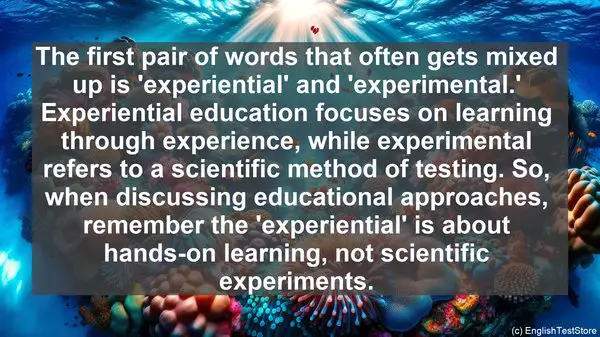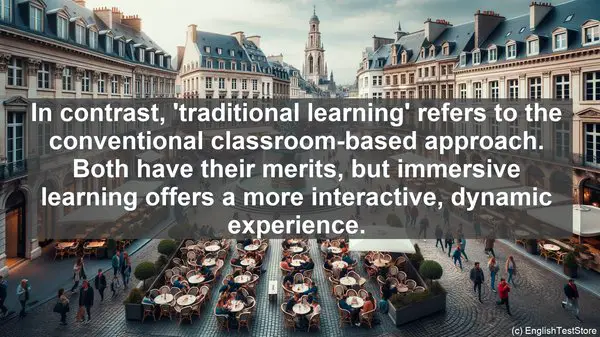Introduction
Today, we’re going to dive into the world of experiential education. While it’s an exciting field, it’s not without its linguistic challenges. In this lesson, we’ll explore the top 10 words that often cause confusion. So, let’s get started!

1. Experiential vs. Experimental
The first pair of words that often gets mixed up is ‘experiential’ and ‘experimental.’ Experiential education focuses on learning through experience, while experimental refers to a scientific method of testing. So, when discussing educational approaches, remember the ‘experiential’ is about hands-on learning, not scientific experiments.
2. Reflection vs. Reaction
Another common confusion arises between ‘reflection’ and ‘reaction.’ In experiential education, reflection is the process of thinking deeply about an experience, analyzing its impact, and deriving insights. On the other hand, a reaction is an immediate response. While both are important, it’s crucial to differentiate between them when discussing learning outcomes.
3. Facilitator vs. Instructor
In a traditional classroom, we often use the term ‘instructor’ to refer to the person leading the session. However, in experiential education, the role is more of a ‘facilitator.’ A facilitator guides the learning process, encourages participation, and creates a supportive environment. It’s a more collaborative approach compared to the traditional ‘instructor’ role.
4. Outcomes vs. Objectives
While ‘outcomes’ and ‘objectives’ may seem similar, they have distinct meanings. ‘Objectives’ are the specific goals you set before an activity, outlining what you aim to achieve. ‘Outcomes,’ on the other hand, are the actual results or changes that occur as a result of the experience. So, objectives are the planned intentions, and outcomes are the observed effects.
5. Assessment vs. Evaluation
When it comes to gauging learning, we often use ‘assessment’ and ‘evaluation’ interchangeably. However, they have different purposes. ‘Assessment’ is the ongoing process of gathering information about a student’s progress, while ‘evaluation’ is a more comprehensive analysis of the overall learning experience. So, assessment is continuous, while evaluation is periodic.

6. Adventure Education vs. Outdoor Education
While both ‘adventure education’ and ‘outdoor education’ involve learning in natural environments, they have distinct focuses. ‘Adventure education’ emphasizes personal growth, teamwork, and overcoming challenges, often through activities like rock climbing or rafting. ‘Outdoor education’ has a broader scope, including environmental awareness and sustainability. So, the activities and objectives differ.
7. Experiential Learning vs. Experiential Teaching
In the realm of experiential education, we often talk about both ‘experiential learning’ and ‘experiential teaching.’ ‘Experiential learning’ refers to the process of acquiring knowledge through hands-on experiences. ‘Experiential teaching,’ on the other hand, is about employing active, participatory methods in the classroom. So, one is about the learner, and the other is about the educator.
8. Immersive Learning vs. Traditional Learning
With the rise of technology, ‘immersive learning’ has gained prominence. It involves creating simulated environments that mimic real-world scenarios, allowing learners to engage actively. In contrast, ‘traditional learning’ refers to the conventional classroom-based approach. Both have their merits, but immersive learning offers a more interactive, dynamic experience.
9. Metacognition vs. Reflection
While ‘reflection’ is about thinking deeply, ‘metacognition’ takes it a step further. It’s the process of being aware of one’s own thinking, understanding how you learn, and making conscious decisions about your learning strategies. So, metacognition is a higher-order cognitive skill that goes hand in hand with reflection.
10. Transferable Skills vs. Subject-Specific Skills
In the context of experiential education, we often talk about ‘transferable skills’ and ‘subject-specific skills.’ Transferable skills, like communication or problem-solving, can be applied across various domains. Subject-specific skills, as the name suggests, are specific to a particular subject or field. Both are important, but transferable skills have broader applicability.
